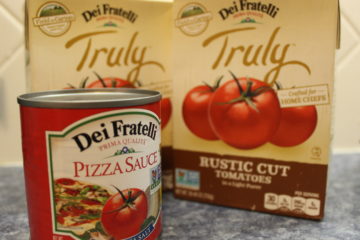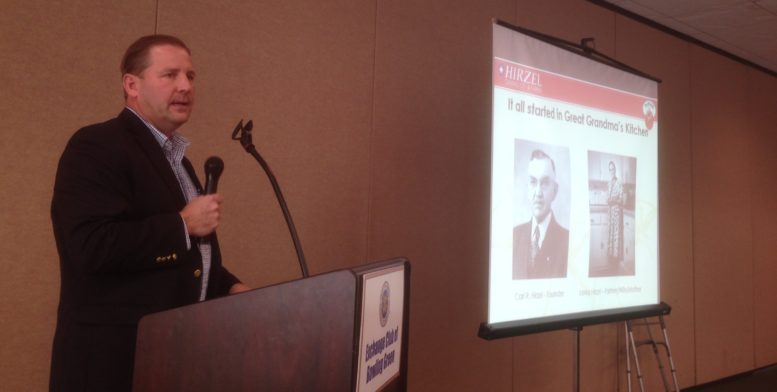By DAVID DUPONT
BG Independent News
When Prohibition knocked Carl Hirzel’s upstate New York brewery out of business, he turned his knowledge of fermentation toward making another product. “He took his technology for making beer and turned it to making sauerkraut,” said his great-grandson Steve Hirzel.
By then Carl and his wife, Lena, had joined his brothers in the Toledo area. “The company literally started in the kitchen,” Hirzel said. Hirzel Canning & Farms continues in operation 93 years later with a fifth generation moving in to keep the firm moving forward.
 And the company still makes sauerkraut, originally sold under the Deer Lodge brand now as Silver Fleece. Business is good for the tart fermented cabbage, Hirzel, president of Hirzel Canning, told the Bowling Green Exchange Club Tuesday. The company is still looking toward fermentation as a way to develop other products for an increasingly fickle consumer.
And the company still makes sauerkraut, originally sold under the Deer Lodge brand now as Silver Fleece. Business is good for the tart fermented cabbage, Hirzel, president of Hirzel Canning, told the Bowling Green Exchange Club Tuesday. The company is still looking toward fermentation as a way to develop other products for an increasingly fickle consumer.
Hirzel said company’s success is rooted in the Great Black Swamp. “In our backyard we’ve been given a garden to grow our crops. … Half of products we get are within 10 miles of the facility.”
Those products now are centered on tomatoes, which the company turns in salsas, pasta and Sloppy Joe sauce and tomatoes in various forms from crushed to whole, in cans and cartons.
“Anything you can think of doing with tomatoes we do,” he said, “except paste.”
The varieties of tomatoes grown locally are not suited to making paste. They are more like what people would pick from their gardens. They don’t need a lot of processing on their way to the consumer.
“We want to heat it up really quickly, sterilize it and put it in the package,” Hirzel said. That’s the difference between the more than 60 products sold under the Dei Fratelli label and its competitors’ products.
Working closely with area growers, some who have been associated with the companies for four generations, the company aims to be “picking it when it’s vine ripe, and then putting it in the package right away. You talk about preserving nutrients and color.”
Those growers are essential. “They’re family farmers, local,” he said. “We wouldn’t be here if we didn’t have this reliable base.”
The company still has a farm at its headquarters in Northwood, where they constantly refine seed varieties to produce the best, most consistent. It’s not uncommon for the company to be testing 30-40 varieties for qualities related to production, a thick skin to protect the fruit in shipping, ease of peeling, and yield.
The farm also is studying organic growing. The conditions here, Hirzel said, makes growing organic tomatoes difficult. But the company is growing grains in the operation started 30 years ago by Hirzel’s uncle, John Hirzel.
The operation contracts with other companies to clean and sort their organic product. Hirzel Canning also runs a composting operation in Pemberville. Cabbage, leaves and food waste from Kroger and Meijer all go into the compost, which is used on the company’s organic fields. Some is sold locally through outlets such as North Branch Nursery.
Hirzel has also been technological innovators. Hirzel said he remembers working with his grandfather Karl Hirzel. “He was a mechanical genius.” Though he was elderly at the time, the elder Hirzel still would step in if there was some mechanical job that needed to be done.
That drive for technological innovation has persisted, Hirzel said, and is key to the company’s survival. “We developed a lot of different things that were the first in the industry. That’s allowed us to compete because we’re not a very large company in terms of our competitors.”
The tomato seedlings are planted in raised beds. “Tomatoes don’t like wet feet,” he said. Then when the harvest begins in mid-August, the entire plant is pulled out, the tomatoes shaken off, and the fruit runs through an electronic scanner that removes green tomatoes, dirt and leaves. All that gets left in the field.
That sense of innovation has taken hold on the culinary side. The company hired an executive chef, Jim Lombardi, to help develop products. Hirzel asked him if there was a risk of running out of ideas for tomato recipes. Lombardi assured him, there was no danger of that.
Hirzel’s charge to the chef was: “I want you to focus on clean ingredients no additives, no preservatives, all non-GMO. That’s always been our brand. … We need it really flavorful right out of the box.”
Hirzel said he’s been impressed in what’s come out of the company’s kitchens, especially new flavors of juices.
Many of the innovations are sold to other manufacturers and food service giants Cisco and Gordon Food Service.
“Speed ready” products in a pouch easy to serve, yet tasty and healthy, are what the food service industry demands. That segment of the market accounts for just over half the Hirzel Canning business.
The company’s kitchen has developed meal starters that would need a larger company as a partner.
Hirzel Canning is in a good position to collaborate with other producers. “We have the flexibility and innovation and the engineering capability,” the president said. “We can do things really quickly, but we have the size to scale it up quickly.”
Hirzel said charity is engrained in the company’s culture. That can involve contributing 38,000 pounds of food to a single drive benefiting the Seagate Food Bank, then turning around and contributing even more to another drive.
It also means helping those affected by Hurricane Matthew in Haiti. Dei Fratelli spaghetti sauce was a convenient way to get a healthy food product to the ravaged country, Hirzel said.
How, he asked, could people not see the devastation in Haiti and not want to help? After all, that’s what the Hirzels have always done: “Make food that’s nutritious and feed people who are hungry.”

